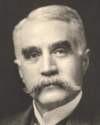 (source)
(source)
|
Charles Francis Brush
(17 Mar 1849 - 15 Jun 1929)
American inventor and industrialist.
|
Progress of the Brush System of Electric Lighting.
from Scientific American (1881)
The ancient saw anent the share of milk obtained by the still suckling seems to be pretty well borne out in the progress of the Brush system of electric lighting. A dozen systems, so-called, have made more noise and have attracted more newspaper attention; but while they are for the most part still “promising,” the Brush system has been quietly taking possession of the field. How far this is due to the superior business management of the company controlling the Brush patent it is impossible to say; the indications are, however, that the remarkable success of the Brush system is mainly due to the practical genius of Mr. Brush in meeting the requirements of outdoor or large room lighting with an efficient generator, and a lamp which is so simple in construction, so automatically regular in action, and so easy to keep in order, that practical business men can afford to use it. It is perhaps the least ornamental in appearance of all lamps, but it gives the light required, and calls for comparatively little care. On the score of economy the users of the lamp profess to be well satisfied; and the rapid and largely extended adoption of the system, abroad as well as at home, would seem to justify the favorable judgment which those who have tried the lamp have free1y expressed with regard to its practical value.
The latest list of prominent users of the Brush light embraces twenty-five rolling mills, iron and steel works, machine shops, car works, wire works, and the like; twenty saw-mills, paper mills, oil works, printing houses, and other factories and manufacturing establishments; twenty woolen, cotton, linen, and silk factories, several of them employing over a hundred lights each; a dozen mines, smelting works, etc.; more than a dozen large wholesale and retail stores, using from six to sixty-four lights; a dozen public parks, docks, summer resorts, and the like, including a mile and a half of river front and docks at Montreal; circuses, colleges, hotels, steamers; and large numbers of city lights in San Francisco, St. Louis, Chicago, Cleveland, Detroit, Grand Rapids, and other cities, besides New York and Brooklyn, where a hundred or more lights are already in use. The contracts of the company in San Francisco called for the erection of about a thousand lamps by the beginning of the current year. Wabash, Indiana, claims the credit of being the first large town to adopt the electric lamp for general illumination, four Brush lights, of 3,000 candle power each, on the court house dome, sufficing for the outdoor needs of the entire town of 10,000 inhabitants.
The company formed in London to introduce the Brush light there have already placed two hundred lights in various parts of the city, and have ordered from Cleveland nearly as many more, contracts having been signed for the lighting of the Houses of Parliament, Charing Cross Station, Ludgate Hill Station, Blackfriars' Bridge, St. Paul's Churchyard, and other conspicuous places. Even the extremely conservative British Admiralty has taken kindly to the Yankee invention, 432 lights having been purchased for the use of the Royal Navy. Mr. Brush is now making a 40 light machine (80,000 candles) designed to throw the entire current in to one huge lamp, which has been ordered for the British torpedo service. The carbons for this artificial sun will be as large as a man's arm, and the light, when directed by a projector of corresponding size, will of itself be a formidable weapon of defence. With a proper system of curtains it will be possible to flash upon an approaching enemy a sudden glare of light that will be little less than blinding.
A less imposing but more admirable application of this light, and one that is being rapidly adopted, is in connection with locomotive headlights. The generator is operated by a small engine taking steam from the boiler and placed opposite the air compressors of the Westinghouse brakes. By attaching the reflector to the forward truck the light may be thrown so as to illuminate the track ahead even when rounding curves. It is obvious that the same machinery which supplies the headlight will also furnish a current for illuminating the cars.
- 17 Mar - short biography, births, deaths and events on date of Brush's birth.
- A Town Lighted by Electricity - article from Cleveland Herald (1880) on first use of Brush lamps to light the city of Wabash, Indiana.
- 31 Mar - births, deaths and events on date Wabash, Indiana, became first U.S. city lighted by electricity.
- Electrifying America: Social Meanings of a New Technology, 1880-1940, by David E. Nye. - book suggestion.




